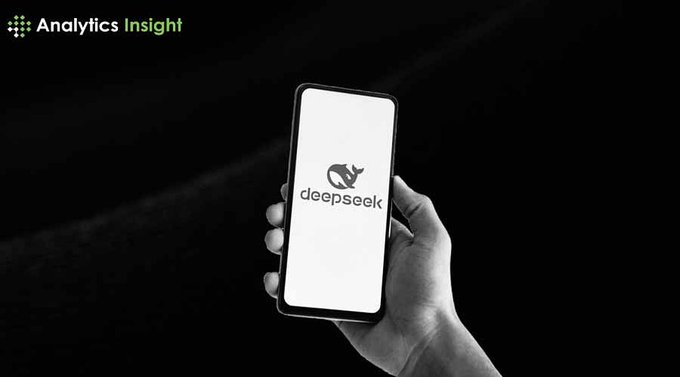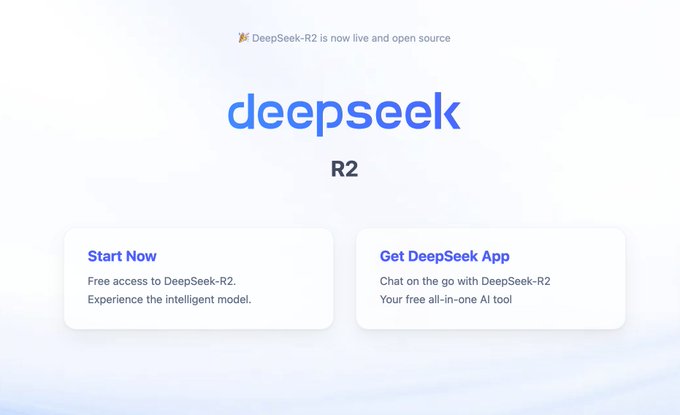The AI Game Just Changed—Again
DeepSeek, the Chinese startup that sent shockwaves through the global tech scene with its low-cost, high-performance AI model, is already gearing up for round two.
Just weeks after its R1 model triggered a massive $1 trillion sell-off in global equities, the company is fast-tracking its next big thing: the R2 model.
Originally slated for a May release, sources close to the company say the Hangzhou-based firm now wants it out as soon as possible.
Why? Because R2 is designed to push the boundaries of AI reasoning, expand beyond English-based logic, and—here’s the kicker—deliver even better coding capabilities.
With competitors still reeling from R1’s impact, DeepSeek’s aggressive move is putting pressure on both U.S. tech giants and the policymakers watching from Washington.
𝗖𝗵𝗶𝗻𝗮’𝘀 𝗗𝗲𝗲𝗽𝗦𝗲𝗲𝗸 𝗖𝗵𝗮𝗹𝗹𝗲𝗻𝗴𝗲𝘀 𝗨𝗦 𝗔𝗜 𝗚𝗶𝗮𝗻𝘁𝘀 𝘄𝗶𝘁𝗵 𝗡𝗲𝘄 𝗥𝟮 𝗠𝗼𝗱𝗲𝗹DeepSeek is accelerating the release of its R2 AI model after R1 disrupted global markets with its cost-effective AI reasoning capabilities! The Chinese startup’s rapid…
How DeepSeek Outsmarted AI’s Biggest Players
The real story behind DeepSeek isn’t just about powerful AI—it’s about how the company has been playing chess while the rest of the industry plays checkers.
Unlike OpenAI and Google, which have spent billions perfecting their models on the most advanced Nvidia chips, DeepSeek took a different route.
R1 was built using older Nvidia A100 chips, proving that smart architecture can outperform brute-force spending.
The company’s secret? A clever mix of Mixture-of-Experts (MoE) and multihead latent attention (MLA) techniques.
Instead of forcing the entire model to process every query, MoE activates only the necessary parts, cutting down costs significantly.
MLA, meanwhile, allows the AI to process multiple pieces of information simultaneously, improving efficiency. The result? A model that delivers OpenAI-level performance at a fraction of the price.
And it’s not just analysts taking note. Companies worldwide, from tech giants like Lenovo and Tencent to local governments in China, are already integrating DeepSeek’s AI into their systems.
Meanwhile, U.S. firms are scrambling to adjust their pricing strategies—OpenAI recently slashed costs, and Google introduced cheaper access tiers for its Gemini AI model.
DeepSeek Accelerates Launch of Next-Gen AI Model 🚀🤖 🔹 DeepSeek to release R2 model earlier than planned, possibly before May 2025 📅🔥 🔹 Startup known for flat hierarchy and research-focused culture 🧠📚 🔹 China embraces DeepSeek after initial concerns over mass chip…
The Man Behind the Disruption
DeepSeek’s rise isn’t just about technology—it’s about vision. That vision belongs to Liang Wenfeng, a low-profile billionaire with a background in quantitative finance.
Liang, who founded High-Flyer, one of China’s most successful quant funds, has long been obsessed with AI.
His company was among the earliest to invest heavily in AI-driven trading, pouring 70pc of its revenue back into AI research.
By 2021, High-Flyer had already built two massive AI supercomputing clusters, including Fire-Flyer II, loaded with 10,000 Nvidia A100 chips.
This strategic bet proved crucial when the U.S. imposed a ban on A100 chip exports in 2022—DeepSeek already had all the computing power it needed.
While China’s major tech firms focused on commercial AI applications, Liang took a different path. His company prioritized raw AI performance over flashy consumer apps, which is why DeepSeek now boasts some of the best AI talent in the China.
His approach to leadership is equally unconventional—employees describe an open, collaborative culture, with Liang personally engaging in technical discussions and empowering Gen-Z researchers.
Unlike China’s grueling “996” work culture (9 a.m. to 9 p.m., six days a week), DeepSeek operates on standard eight-hour workdays.
The company also pays top dollar, offering nearly double the salaries of competitors to attract elite researchers.
What’s Next—and Why the U.S. Should Be Worried
As DeepSeek prepares to launch R2, the geopolitical implications are becoming impossible to ignore.
The U.S. government has already identified AI leadership as a national priority, and DeepSeek’s rapid success is likely to raise alarms in Washington.
Meanwhile, China has fully embraced DeepSeek’s rise. Government agencies, state-owned enterprises, and tech firms are lining up to integrate the company’s models into their systems.
Chinese President Xi Jinping and Premier Li Qiang have signaled their approval, and sources indicate that Beijing has advised DeepSeek to keep a low profile—likely to avoid drawing unnecessary scrutiny from Western regulators.
But outside of China, DeepSeek is already facing pushback.
Countries like South Korea and Italy have removed the company’s apps from their stores over privacy concerns, and some Western AI leaders have accused the firm of having access to restricted Nvidia chips.
While no concrete evidence has emerged to support these claims, it’s clear that DeepSeek’s rapid ascent is reshaping the AI landscape.
Liang himself acknowledged the challenge last year: “Our problem has never been funding,” he told Chinese media. “It’s the embargo on high-end chips.”
As the race for AI dominance heats up, one thing is certain—DeepSeek isn’t just playing catch-up. It’s forcing the world to rethink what’s possible in AI.





